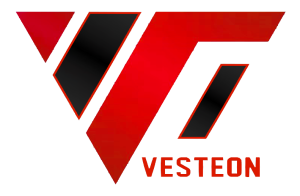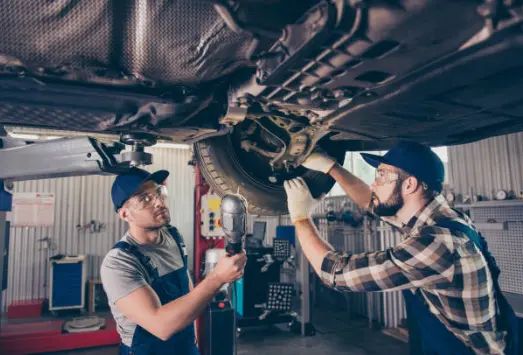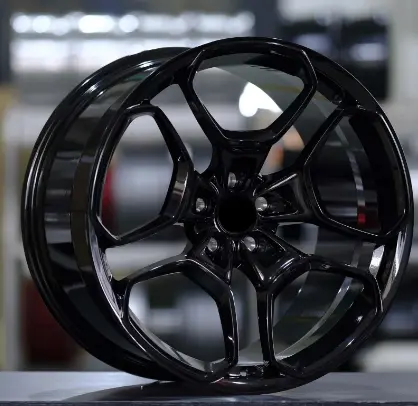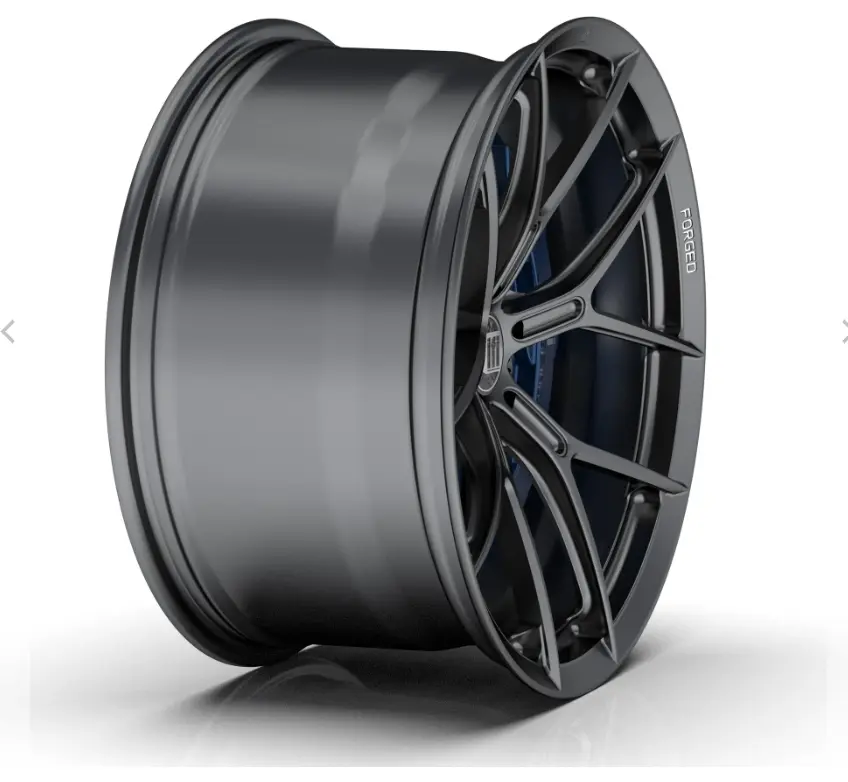Custom forged wheels are precision-engineered wheels crafted from solid metal using a sophisticated forging process. This ensures that the metal is compressed and shaped under high pressure, resulting in a more durable and lightweight product. The production involves the selection of high-grade aluminum alloy, which enhances strength while minimizing weight. This process is highly controlled, allowing manufacturers to create bespoke designs tailored to individual specifications, significantly increasing their customization potential.
Benefits of Custom Forged Wheels
The benefits of custom forged wheels are diverse and noteworthy. You gain enhanced strength and reliability due to the densification of materials during the forging process, which effectively minimizes the risk of crack propagation that can occur in cast wheels. Additionally, these wheels allow for unique design opportunities, enabling you to express individuality with precision aesthetics. The improved performance characteristics, such as weight efficiency and strength-to-weight ratio, also contribute to better fuel efficiency and reduced wear on suspension components.
How are OEM Wheels Different from Aftermarket Wheels?
Definition of OEM Wheels
OEM wheels, or Original Equipment Manufacturer wheels, are produced by the vehicle manufacturer or an authorized supplier. They are designed specifically for a particular make and model of a vehicle, ensuring that they meet the exact specifications and safety standards set by the manufacturer. In contrast, aftermarket wheels may not adhere to these stringent standards and can vary widely in quality and design.
Common Materials Used in Both Types of Wheels
Both custom forged wheels and OEM wheels often use aluminum and magnesium due to their lightweight and durable properties. However, the quality of the materials can differ significantly. While OEM manufacturers utilize high-grade aluminum alloys that meet established safety standards, aftermarket wheels may not guarantee the same level of material integrity. As a result, you should ensure that the chosen wheels not only fit your vehicle but are also made from reliable materials that enhance performance and safety.
Which Type Offers Better Durability?
Manufacturing Standards for OEM Wheels
OEM wheels are typically subjected to high manufacturing standards, resulting in a product known for its durability and reliability. These wheels are often rigorously tested through a series of quality assurance checks, ensuring that they withstand various driving conditions. Being compliant with safety regulations, you can trust that these wheels will provide longevity and consistent performance throughout the lifespan of your vehicle.
Material Quality and Testing for Aftermarket Options
Aftermarket wheels can sometimes lack the same level of oversight when it comes to material quality and testing. While many reputable aftermarket brands produce high-quality custom forged wheels, it’s crucial to investigate the company’s testing methods and certifications. Some manufacturers may cut corners to reduce production costs, leading to compromised safety and durability. Always ensure that aftermarket options have undergone rigorous testing and utilize high-quality materials to guarantee your investment.
Real-World Performance Comparisons
In real-world scenarios, comparisons often reveal that OEM wheels exhibit more consistent performance due to their designed specifications. However, custom forged wheels also demonstrate significant advantages in strength and customization, especially for specific applications. Ultimately, the decision between OEM and aftermarket options will hinge on your driving needs, preferences, and how rigorous you are about adhering to manufacturer standards.
Do Custom Forged Wheels Impact Vehicle Performance?
Effect on Ride Quality
Custom forged wheels can positively influence ride quality, as their lightweight design can lead to improved suspension response and decreasing unsprung weight. As you enhance your vehicle’s ride, you gain better control and feel of the road, benefiting from more responsive driving dynamics. Custom forged wheels often have a more significant effect when combined with specific tire profiles, resulting in a markedly different experience than standard OEM options.
Influence on Handling and Control
The handling characteristics of custom forged wheels can result in enhanced cornering stability and overall vehicle responsiveness. Due to their tailored design and weight distribution, these wheels often allow for a more intuitive driving experience. As they are often designed with racing and high-performance applications in mind, you may find that upgrading to custom forged wheels elevates your vehicle’s performance and handling characteristics significantly compared to traditional OEM wheels.
For enhanced options, consider exploring the offerings from Vesteon for reliable OEM wheels that offer a firm balance of performance and durability to meet your specific needs. While both OEM and custom forged wheels offer unique advantages, understanding the differences will help you make a more informed decision.
Learn more about OEM wheels here and explore what custom forged wheels can contribute to your vehicle. The choice ultimately comes down to your specific needs and how you plan to leverage the benefits of either option.
How Does Cost Factor into Your Decision?
Initial Purchase Price Differences
When considering custom forged wheels versus OEM options, the initial purchase price often serves as a deciding factor. Typically, OEM wheels come with a price tag that aligns with the manufacturer’s specifications and quality standards. These prices can vary widely depending on the vehicle make and model, but they might give you a sense of security concerning compliance and reliability. In contrast, custom forged wheels, while potentially more costly upfront, provide unparalleled personalization and performance enhancements that justify the investment for many enthusiasts.
Moreover, the price differences can stem from the materials used in manufacturing and the manufacturing process itself. Custom forged wheels are crafted using high-quality materials and advanced techniques, ultimately reflecting their cost. Understanding the price structure of both options is crucial, alongside evaluating their benefits and long-term advantages.
Long-Term Value and Maintenance Costs
Beyond initial cost considerations, it’s essential to analyze the long-term value and maintenance costs associated with your wheel selection. OEM wheels typically promise a longer service lifespan because they are designed specifically for certain vehicle configurations and undergo rigorous testing. This durability can translate into reduced maintenance and fewer replacements, which ultimately save you time and money.
On the other hand, while custom forged wheels may require a higher upfront cost, they can deliver significant benefits in performance, weight savings, and aesthetics. If you engage in demanding driving situations, the enhanced performance characteristics can mitigate wear and tear, leading to potential savings in other areas, such as suspension components and even tires. Thus, analyzing both immediate purchase prices and long-term value will help inform your decision-making process when weighing the pros and cons of each option.
Where Can You Get High-Quality Custom Forged Wheels?
Leading Providers and Manufacturers
To secure high-quality custom forged wheels, identifying reputable providers and manufacturers is pivotal. Several manufacturers specialize in creating custom wheels that cater to performance enthusiasts, allowing for personalized dimensions and finish options. You should look for companies that emphasize advanced manufacturing techniques and material quality to ensure that you are making a sound investment.
Consider exploring options from Vesteon, which offers a variety of OEM wheels designed for performance and compatibility across different vehicle models. With access to products that reflect high-quality standards set by manufacturers, you can maximize your vehicle’s performance while adhering to compliance norms. Custom forged wheel providers should also be transparent about their manufacturing processes and testing practices, enabling you to make an informed choice that aligns with your performance needs.
Considerations Before Making Your Choice
Climate and Driving Conditions
Before making your final choice between OEM and custom forged wheels, consider the climate and driving conditions you typically encounter. Different wheel materials and designs can behave uniquely under various elements. For example, if you reside in an area with extreme temperatures or harsh weather conditions, you need to select wheels that can endure such environments without compromising performance or safety.
Custom forged wheels are often engineered to tolerate extreme driving conditions better than their OEM counterparts. However, this is contingent on the manufacturing practices and materials used. Assessing how the wheels adapt to factors like moisture, road debris, and temperature changes can prove vital in your decision-making process.
Vehicle Type and Usage
The type of vehicle and usage significantly influences your wheel selection. If you drive a high-performance vehicle designed for racing, investing in custom forged wheels can provide you with the tailored performance enhancements necessary for that application. Their lightweight composition will likely improve acceleration and handling clear benefits in competitive or performance-oriented scenarios.
Conversely, if your vehicle serves routine commutes or light recreational activities, OEM wheels can meet your requirements, offering reliability without the extra expense of custom solutions. Ultimately, assessing your vehicle’s designated use will clarify what features you prioritize in your wheel choice. This consideration ensures that whether you choose custom forged or OEM options, your wheels will match the demands of your driving environment and style.
In summary, weighing your options between custom forged wheels and OEM choices involves a thorough analysis of several factors, including costs, driving conditions, and vehicle specifics. By navigating these aspects carefully, you can arrive at a decision that not only enhances your vehicle’s performance but also aligns perfectly with your personal preferences and needs.



